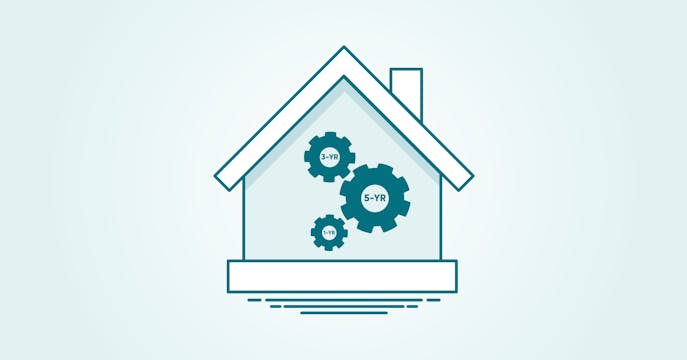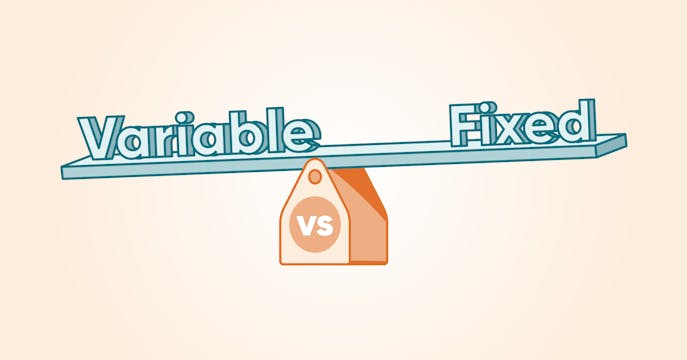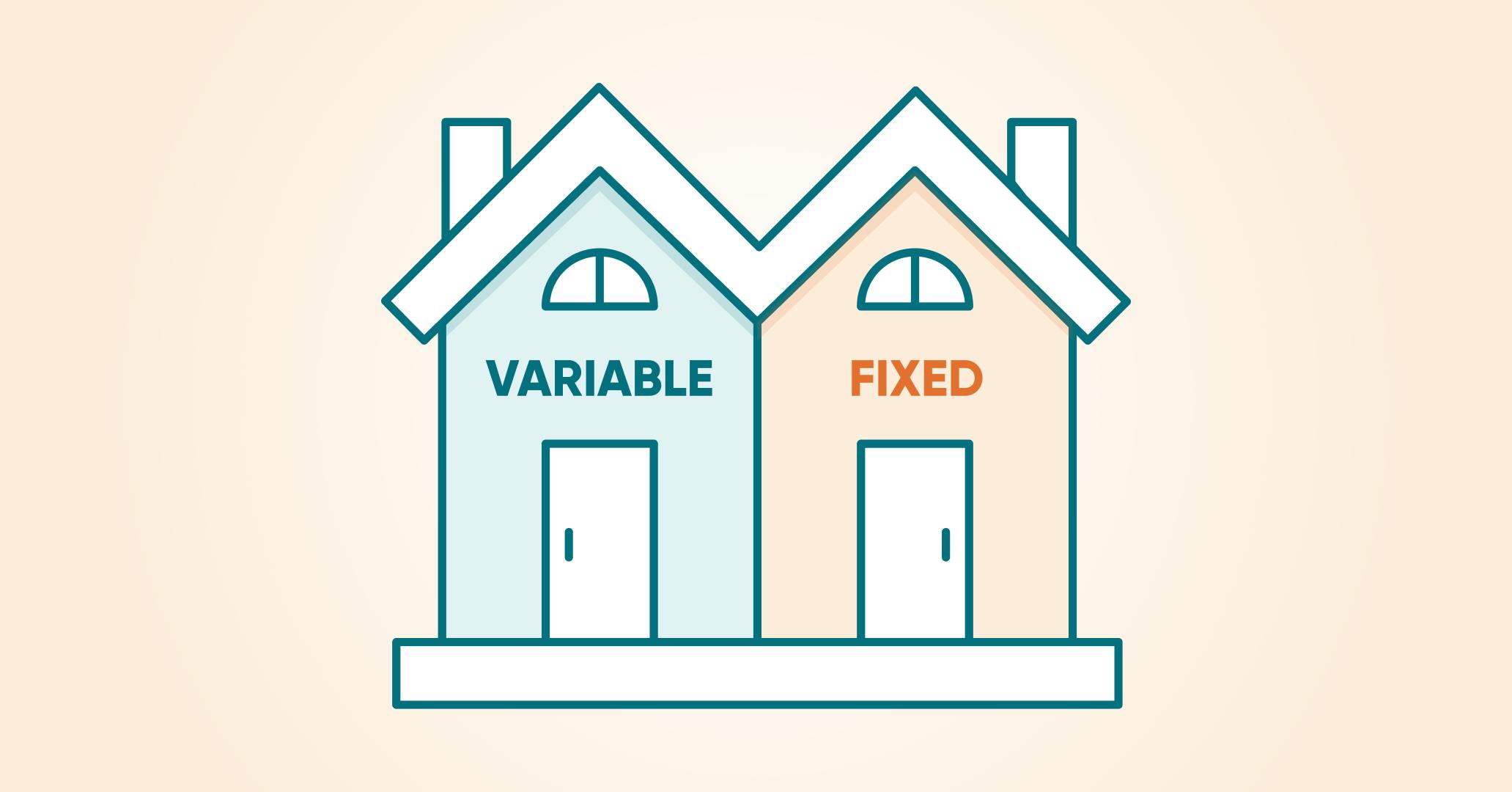Variable vs Fixed Mortgage Rates
What's the difference? Mostly, it's the potential to save more, or stress less.
Decision, decisions. The rate you decide on will impact your mortgage payments, flexibility and savings goals. Here are some pros and cons — then talk to us. We'll help quickly help you sort it out.
Is your best rate choice behind Door #1 or #2?
When thinking about buying a home or renewing your mortgage, one of the first questions asked is the difference between a variable rate mortgage and a fixed rate mortgage.
The rate type you choose can be personal, tied not only to your financial situation but also to your comfort level with the 'risk' of changing rates and payments.
And, there are also mortgage rate savings to consider. Here's some info to consider when deciding which rate door you should walk through.
What are the differences between a variable and a fixed rate?
A variable rate mortgage means your interest rate changes along with movements in the prime rate — and your interest costs and mortgage payments along with it. Usually offered in a 5-year term, variable rates are often lower than 5-year fixed rates (including lender discount off of prime) because of the potential flux and resulting budget adjustments (adding risk).
A fixed rate mortgage is just that — your rate is set at the beginning of your term (5-year length is the most common), and your payments stay the same until it's time to renew. Often higher than a variable rate, a fixed rate will provide both interest and payment stability over your term. So while costing more in interest, it's considered a safer option to ensure a consistent budget.
Here are some pros and cons of a variable vs. fixed rate mortgage:
Variable Rate Mortgage
Often lower vs. fixed, but interest rate amount can change during term.
THE PROS: Save More
- Likely save more on interest over your mortgage term compared to a (higher) fixed rate
- If rates go down, you'll pay less interest for a budget break
- If rates go up, you may still save more over a fixed rate
- Lower penalties for breaking or switching (3 months interest vs IRD with fixed rate)
- Historically, variable rates tend to outperform fixed rates for savings
THE CONS
- If rates go up, your payment can increase, affecting your monthly budget
- If rates go up, you'll pay more interest
- Some variable rate products aren't portable (transferable from a current property to a new one) if you sell the home during your term
- You may worry more about rates rising during your term
Fixed Rate Mortgage
Often higher vs. variable, but interest rate amount is fixed during term.
THE PROS: Stress Less
- Rate is set for the duration of your mortgage term
- Payments and interest won't change, making it easier to budget
- If rates go up during your term, you're protected
- Fixed-rate terms are usually portable (can go from current property to a new property)
- You may feel more peace of mind if rates rise during your term
THE CONS
- Higher penalties for breaking or switching (Interest Rate Differential (IRD) or 3 months interest, whichever is greater)
- Historically, fixed rates are higher than variable rates, which may cost you more
- If rates go down during your term, you'll need to refinance or wait for your renewal to take advantage
Which mortgage rate is the most popular?
Typically, around 60% of our clients choose a 5-year fixed rate mortgage versus around 30% for a 5-year variable one. The 5-year term length is the most popular because it's the one that banks like to compete on, so it often carries the best value.
During the pandemic's rock-bottom rate period, this trend temporarily reversed to favour variable rate mortgages. The wide spread between variable and fixed rates tipped many new and established home buyers into the much lower 5-year variable rate. As well, when fixed rates began to increase before the variable rate started to catch up, the higher federal rate stress test requirement pushed many into a variable rate to lower their qualifying stress-test rate.
Read more about how these rate types are set.
Who typically chooses a variable rate mortgage?
Variable rate mortgages are popular with our clients who can handle a certain amount of risk and prefer to be aggressive in maximizing their savings. Older or more financially-established clients look towards a variable rate to ride out the highs and lows for savings over time. Willing to take the risk? This group says: "Yes, sign me up.'
Plus, these clients can typically handle a higher payment if the rate goes up. Variable rate mortgages also work better for homeowners that may need to break their mortgage before the end of their term, as variable rates usually offer lower penalties to make a change or switch lenders.
Who typically chooses a fixed rate mortgage?
For our True North Mortgage clients, the 5-year fixed rate is the most common choice for first-time home buyers, those who are risk-averse, or who prefer to stick to a monthly budget so that their payments don't fluctuate. Want more peace of mind? This group says: "Yes, I like to sleep at night."
Fixed is the rate that your parents, and your parent's parents, went with for decades. That doesn't mean it isn't hip to choose a fixed rate. Payments that don't change during the term can be a nice way to focus on other things. It allows more time to settle into a payment budget while consistently paying down the principal — and offers a smart strategy for a stress-free mortgage experience.
Younger or more risk-cautious clients tend to choose fixed. That makes sense, considering the risk level of starting out with your first home and having newer financial goals. Or not wanting to become financially exposed over variable rate changes if your budget doesn't have much wiggle room.
As well, if you plan on staying put over your mortgage term, and if variable and fixed rates are similar (a smaller spread between them), choosing a fixed rate can also make more sense for the added protection.
Related: How Government Bond Yields Relate To Mortgage Rates
How much lower are variable rates?
The typical difference between a 5-year variable and fixed rate is 0.25 to 1% (during the pandemic, the spread increased to around 1.5%). In general, some of our clients feel that any rate spread is enough to offset the added risk and are willing to absorb the increased payments if rates do rise during their mortgage term (with the potential for them to fall again, of course).
In a CIBC study done a few years ago, it was shown that 88% of the time, it paid off financially to take a variable rate mortgage over a fixed rate mortgage.
Considering a variable rate mortgage? There are two payment types available.
Our in-house lender only offers an ARM (Adjustable Rate Mortgage), which has floating payments that adjust along with interest rate changes. This product helps to keep your variable-rate savings and mortgage amortization intact and on track.
Some big banks offer a static-payment product called a VRM (Variable-Rate Mortgage). This product offers budget stability with fixed payments. BUT if rates go up and stay up during your term, there is an added risk that you'll face an increased amortization at renewal or have to raise your payments anyway if you hit your trigger rate and trigger point.
Your rate choice can come down to three questions.
- Can you sleep calmly at night, knowing the risks involved with a variable rate?
- Can your budget handle a 3 to 4 percentage increase in your mortgage rate (higher mortgage payments) if the prime rate climbs dramatically?
- Do you plan to sell your property within three years, or want a faster way to pay down your mortgage?
The easiest decision? Talk to us. We can help you decide.
We have the industry experience and market know-how to outline your best rate options and provide targeted advice based on your unique mortgage situation.
Whether rates are trending up or down, we'll go over the details so that you can make an informed choice.
Variable or fixed? Whichever you choose, you'll save a lot more with your best-possible rate — through us.
Compare rates will our great calculator, then connect with us for your exact numbers:
Compare Rates and Save
Various tools and functions of this website perform calculations and provide cost estimates. These tools are designed for illustrative purposes only and make many assumptions that may not reflect all situations. Please use these tools in collaboration with a True North Mortgage agent. True North Mortgage does not guarantee the accuracy, reliability or completeness of these tools or calculations.
Save more or stress less? Get great advice to help.
What do you need? We can help

How much will it cost to break your mortgage?
Find out how what penalty you might pay and when it makes sense to break.
Learn More
Mortgage Term Rates, Explained
Why do different terms have different rates? Learn more about the inner workings.
Learn More
Should you choose a variable rate in 2025?
How to decide between variable-rate FOMO or JOMO? We can help.
Learn More

